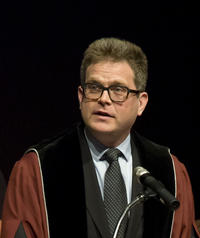 Measurement is a constant in the daily life of a university. It’s a basic feature of the student-teacher relationship: Professors assess student performance by grading exams, essays, and lab assignments. And at the end of a course, students “grade” their professors by completing a course satisfaction survey.
Measurement is a constant in the daily life of a university. It’s a basic feature of the student-teacher relationship: Professors assess student performance by grading exams, essays, and lab assignments. And at the end of a course, students “grade” their professors by completing a course satisfaction survey.
The university itself is constantly measured against a wide variety of metrics. For example, how successful are graduates in finding jobs and careers in particular fields? What is the average salary of a graduate after five years? How productive are faculty in producing research, and what impact does their research have? How does the university rank against its peers around the world?
On the whole, metrics are good, because they create accountability. Universities are costly enterprises—students pay tuition, governments invest heavily in universities, and donors make charitable gifts. All of them have an obvious interest in knowing that their investments are worthwhile and put to good use.
Although we need these metrics, they are a limited tool. Much of what happens at a university is hard to measure—and if we only focus on what’s easy to assess, we may not recognize the full value of what we do. In his article on page 7, Grebel’s Dean, Troy Osborne, makes the case that the value obtained from a liberal arts education has been overlooked in recent years. Skills such as persuasive written communication, critical thinking, and the capacity to ask good ethical questions are hard to capture in a simple metric—but they are valuable and vital.
The most important things we do at Grebel might be beyond our ability to measure. If we want to be true to our roots, then we must uphold the idea that education is more than the transmission of assessable skills, or the assignment of grades. As Mennonite professor John D. Roth suggests, education is more like planting a tree:
“When we meet students for the first time, we agree to participate in small gestures of planting, watering, pruning or nurturing. We do so as an expression of hope that at some point in the future—perhaps long after our direct contact with these students has ended—this time together will matter in ways that we can scarcely imagine.”1
This edition of Grebel Now brims with stories of learning that elude easy measurement, including:
• Theo Wiederkehr’s report on a course called The Violence of the Bible, taught by Derek Suderman, in which he reflects on his efforts to listen more closely to people of other faiths, particularly Indigenous peoples.
• Kim Rempel’s comments on Dr. Ysaye Barnwell’s visit to Grebel, and the power of musical traditions to both include and exclude.
• Plans for a new “PeaceTech” community in the Grebel residence, to explore questions of technology, ethics, justice, and peace.
• A lecture by John Rempel, followed by a lively discussion, at Toronto Mennonite Theological Centre.
What will grow from these seeds? The results are not instantly apparent, and the outcomes are a mystery for now. In the end, our work here at Grebel requires a measure of faith and hope.
1 Roth, John D. Teaching That Transforms: Why Anabaptist-Mennonite Education Matters, Scottdale: Herald Press, 2011. p.126.






